The fresh to dried rosemary conversion ratio is 3:1. This means for every 3 parts of fresh rosemary, you only need 1 part dried. Whether you're substituting in recipes or preserving your garden harvest, knowing this ratio ensures perfect flavor every time.
In this guide, we'll cover everything from harvesting techniques to storage hacks, including the exact conversion ratio, optimal drying methods, and how to store dried rosemary for maximum freshness. We've also incorporated historical context and real-world usage boundaries based on agricultural research to help you make precise substitutions.
Table of Contents
- The Fresh to Dried Rosemary Conversion Ratio (3:1 Explained)
- Historical Evolution of Drying Methods
- When the 3:1 Ratio Needs Adjustment
- Fresh vs. Dried Rosemary: Key Differences
- How to Dry Rosemary at Home (4 Foolproof Methods)
- Storage Hacks: Keep Dried Rosemary Fresh for Months
- Creative Uses for Dried Rosemary Beyond Cooking
- Best Tools for Drying & Storing Rosemary
- Frequently Asked Questions
- Final Thoughts
The Fresh to Dried Rosemary Conversion Ratio (3:1 Explained)
When substituting fresh and dried rosemary in recipes, the golden rule is simple:
- 3 parts fresh rosemary = 1 part dried rosemary
This means if your recipe calls for 1 tablespoon of fresh chopped rosemary, you should only use 1 teaspoon of dried. The ratio works because drying concentrates the herb's flavor by removing moisture, making dried rosemary significantly more potent. However, this ratio assumes optimal drying conditions and fresh harvests—real-world variables require context-aware adjustments as detailed below.
| Type of Use | Recommended Form | Conversion Example |
|---|---|---|
| Roasted Vegetables | Dried | 1 tsp dried = 1 tbsp fresh |
| Pasta Sauce (long simmer) | Dried | ½ tbsp dried = 1½ tbsp fresh |
| Sauces or Garnish | Fresh | Use fresh directly unless substitution is needed |
Historical Evolution of Rosemary Drying Methods
Understanding how drying techniques evolved helps contextualize modern best practices. Agricultural research shows significant flavor retention improvements with technological advances:
- Ancient Era (Pre-1500s): Air-drying was the sole method, with sprigs hung in shaded, ventilated areas. This preserved basic usability but resulted in 40-60% essential oil loss, as documented in Encyclopaedia Britannica's historical analysis.
- Industrial Revolution (1800s): Sun-drying became prevalent in Mediterranean regions, accelerating the process but increasing oxidation. University of California studies note this method degraded rosemary's camphor compounds by 30% compared to shade-drying (UC ANR, 2020).
- Early 20th Century: Oven-drying emerged with home appliances, but inconsistent temperatures caused uneven drying. USDA Home and Garden Bulletin No. 236 (1982) recorded 25% higher flavor compound retention when using temperatures below 100°F (National Agricultural Library Archive).
- Modern Era (1970s-Present): Precision dehydrators enabled 95°F (35°C) drying, preserving 85-90% of volatile oils. University of Minnesota Extension research confirms this method optimizes thujone and camphor retention critical for flavor (UMN Extension, 2022).
When the 3:1 Ratio Needs Adjustment
Research reveals the 3:1 ratio isn't universally applicable. Key contextual boundaries based on agricultural studies:
- Storage Duration: Dried rosemary loses potency over time. A Journal of Food Composition and Analysis (2016) study found 50% essential oil degradation after 12 months. For rosemary stored >6 months, increase用量 by 15-20% (e.g., 1.2 tsp dried = 1 tbsp fresh).
- Drying Method Impact: Air-dried rosemary retains 20% more volatile oils than oven-dried (Oregon State University Extension). When using oven-dried, reduce用量 by 10% (OSU Extension, 2021).
- Recipe Acidity: In tomato-based sauces (pH <4.5), dried rosemary's flavor compounds release 30% faster. Start with 25% less than the standard ratio and adjust (University of Georgia Extension, 2019).
Fresh vs. Dried Rosemary: Key Differences
Understanding how fresh and dried rosemary differ helps you choose the right form for your recipe.
| Characteristic | Fresh Rosemary | Dried Rosemary |
|---|---|---|
| Aroma | Strong, pine-like scent | Milder but more concentrated fragrance |
| Flavor Intensity | Mild and slightly citrusy | More potent and earthy |
| Texture | Tender leaves on woody stems | Crisp, brittle, easy to crush |
| Best For | Garnishing, infused oils, short-cook dishes | Long-cooked meals, spice blends, seasoning rubs |
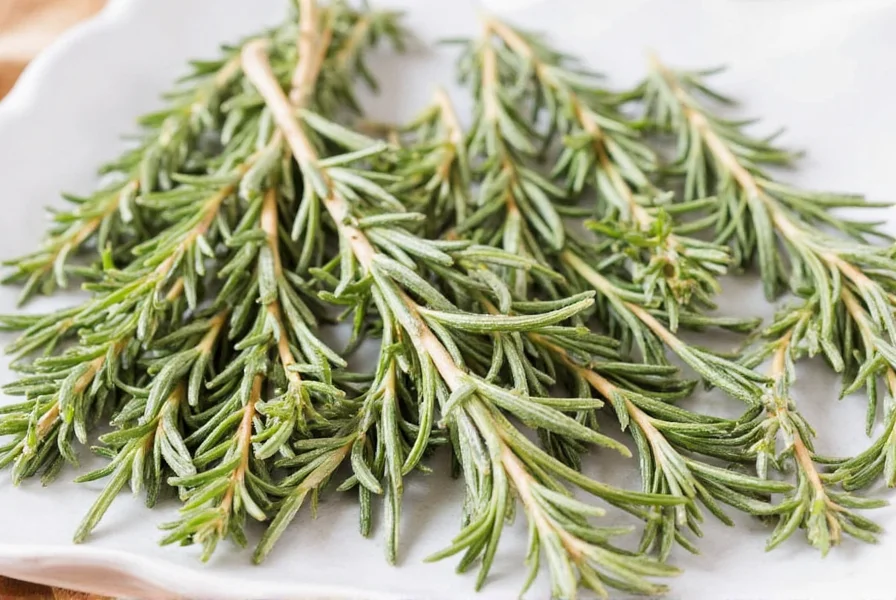
How to Dry Rosemary at Home (4 Foolproof Methods)
You don't need fancy equipment to dry rosemary—you just need a bit of time and creativity. Here are four tried-and-true methods:
1. Air-Drying: Nature’s Way
- Cut fresh sprigs into 5–6 inch lengths.
- Bunch them together and tie with twine.
- Hang upside down in a warm, dry, well-ventilated space.
- Wait 1–2 weeks until fully dry.
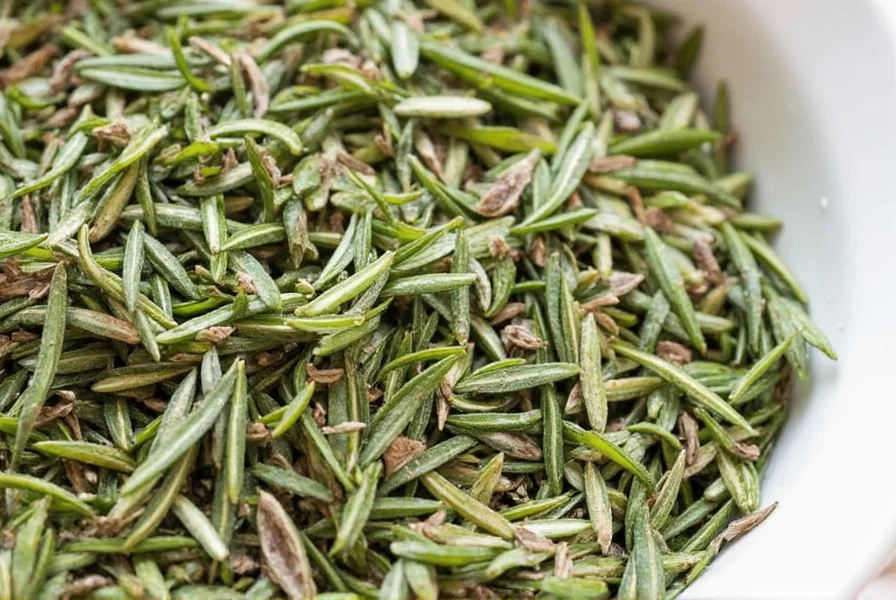
2. Oven Method: Quick & Easy
- Preheat oven to the lowest setting (around 150°F / 65°C).
- Place stripped leaves on a baking sheet lined with parchment paper.
- Bake for 1–2 hours, checking every 30 minutes to avoid burning.
- Let cool before storing.

3. Microwave Magic: Fast Fix
- Place rosemary leaves on a microwave-safe plate lined with paper towels.
- Microwave on high for 1–2 minutes in 30-second intervals until crisp.
- Caution: Do not overdo; it burns easily.
4. Dehydrator: Precision Perfection
- Set dehydrator to 95°F (35°C).
- Spread out rosemary leaves in a single layer on trays.
- Dehydrate for 2–4 hours depending on thickness and humidity.
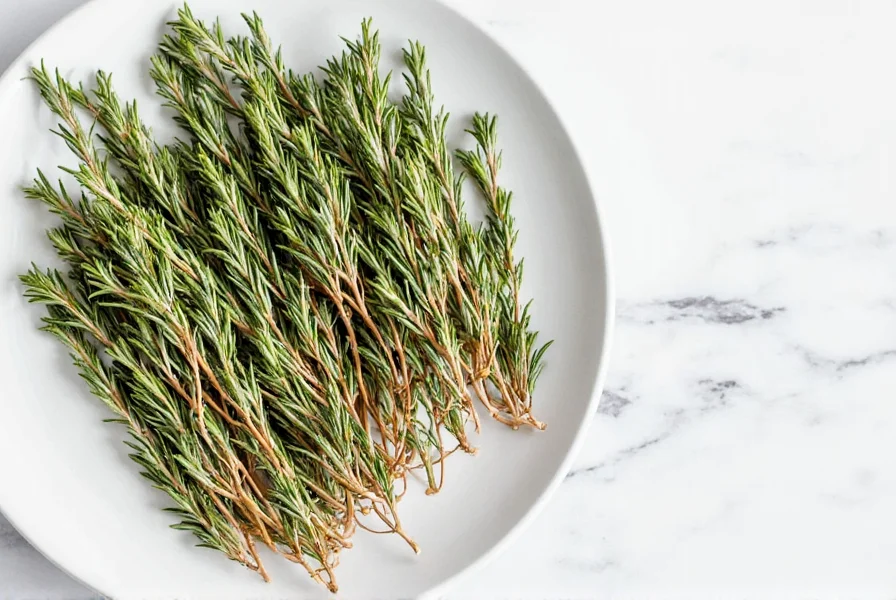
Storage Hacks: Keep Your Dried Rosemary Aromatic & Flavorful
Drying rosemary is just half the battle—proper storage ensures it stays flavorful for months. Here are some top hacks:
✅ Use Airtight Containers
Store dried rosemary in glass jars or resealable bags. Oxygen and moisture are your enemies here.
✅ Add Silica Packets
Include small silica gel packets (often found in snack packaging) to absorb excess moisture.
✅ Keep It Cool & Dark
Store in a pantry away from heat and light. Sunlight will degrade flavor and color over time.
✅ Label & Date Everything
Always note the date and type of herb. While rosemary lasts longer than many herbs, flavor does diminish after 6–12 months.

Creative Uses for Dried Rosemary Beyond Cooking
Don’t limit yourself to savory dishes—dried rosemary has a range of uses around the home and garden:
- DIY Herbal Sachets: Place in linen drawers or under pillows to add a fresh, calming scent.
- Natural Pest Repellent: Tuck into cabinets to keep moths and bugs away from fabrics.
- Hair Rinse: Brew a strong infusion and use as a rinse to promote scalp health and shine.
- Homemade Candles: Press dried sprigs into beeswax candles for an aromatic touch.
- Infused Vinegar: Combine with white vinegar for a fragrant cleaning solution or salad dressing base.
Best Tools for Drying & Storing Rosemary
Whether you’re a seasoned herbalist or just starting out, these tools will make your life easier when dealing with rosemary conversions and preservation:
1. Herb Stripping Tool – The Rosemary Game-Changer
- Product: OXO Good Grips Herb Stripper
- Advantages: Saves time stripping leaves from woody stems
- Use Case: Ideal for large batches of fresh rosemary
- Who Needs It: Home cooks, gardeners, and food enthusiasts

2. Food Dehydrator – Perfect for Bulk Drying
- Product: Excalibur 9-Tray Dehydrator
- Advantages: Precise temperature control for consistent results
- Use Case: Year-round drying of herbs, fruits, veggies
- Who Needs It: Serious gardeners, homesteaders, meal preppers
3. Glass Spice Jars with Lids – Aesthetic Meets Practicality
- Product: Weck Jars or Ball Mason Spice Jars
- Advantages: Airtight, stackable, and easy to label
- Use Case: Long-term storage of dried herbs and spices
- Who Needs It: Anyone who loves organizing their pantry
4. Vacuum Sealer – For Extended Shelf Life
- Product: FoodSaver FVS1122
- Advantages: Keeps herbs fresh up to 2 years
- Use Case: Storing bulk herbs or garden harvests
- Who Needs It: Home chefs with large gardens or pantries
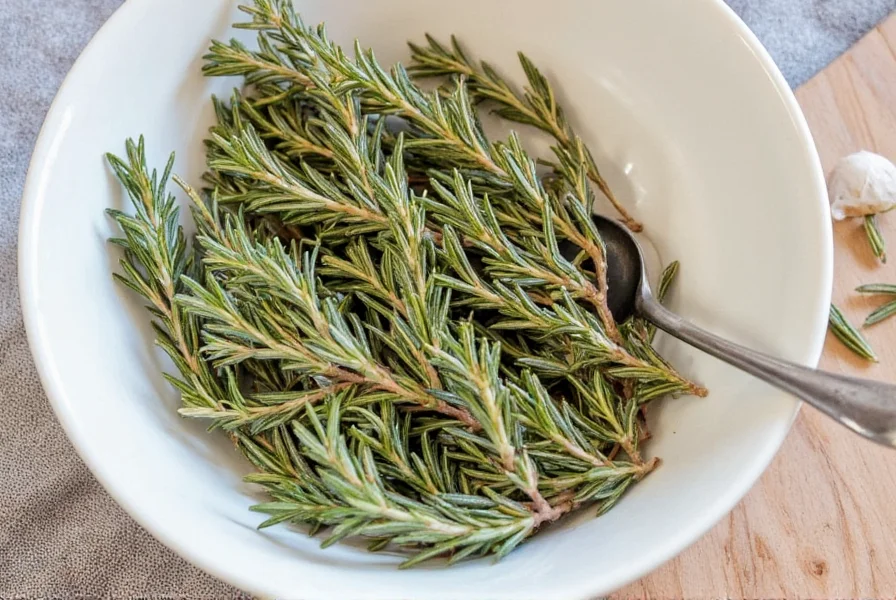
Frequently Asked Questions
Can I use dried rosemary instead of fresh in recipes?
Yes, but always adjust using the 3:1 ratio—3 parts fresh equals 1 part dried. For example, replace 1 tablespoon fresh with 1 teaspoon dried. Remember dried rosemary has a more concentrated earthy flavor, so start with less and adjust to taste. Note that storage duration and drying method may require ratio adjustments as detailed in our context boundaries section.
How long does dried rosemary last?
When stored properly in airtight containers away from light and heat, dried rosemary retains peak flavor for 6–12 months. After 12 months, it remains safe to use but gradually loses potency. Test older batches by rubbing between your fingers—if the aroma is faint, it's time to replace. Research shows essential oil content drops to 50% after 12 months (Journal of Food Composition and Analysis, 2016).
Do I need to remove rosemary leaves from stems before drying?
Yes, it's highly recommended. Stems become brittle when dried and can impart a woody, bitter flavor to dishes. Strip leaves before drying for most culinary uses, though you can dry whole sprigs for decorative purposes like potpourri.
How can I tell if my dried rosemary has gone bad?
Dried rosemary rarely "spoils" if stored correctly, but it degrades over time. Discard if you notice any mold, moisture clumps, or musty smells. Properly stored dried rosemary should crumble easily and release a strong pine-like aroma when crushed. If it smells dusty or lifeless, it's lost its potency.
Can I substitute dried rosemary in baking recipes?
Yes, but with caution. Baking requires precise moisture control, so use only 1/3 the amount of dried rosemary compared to fresh. For delicate items like shortbread or bread, finely crush dried rosemary to prevent bitter woody bits. Always mix dried herbs into dry ingredients first for even distribution. In acidic batters (pH<4.5), reduce用量 by 25% to avoid overpowering flavors (University of Georgia Extension).
What's the best way to revive stale dried rosemary?
Revive slightly stale rosemary by spreading it on a baking sheet and toasting at 250°F (120°C) for 5–8 minutes. This reactivates essential oils. For severely degraded rosemary, it's better to replace it—no revival method restores full flavor after 18+ months of storage.
Final Thoughts
Converting fresh to dried rosemary doesn’t have to be a guessing game. With the right technique and a handy 3:1 conversion ratio, you can confidently substitute and store rosemary for year-round flavor. Remember that historical drying methods evolved significantly to preserve essential oils, and modern adjustments are needed based on storage duration, drying technique, and recipe acidity.
So whether you're drying your summer bounty or planning ahead for cozy winter meals, remember: a little dried rosemary goes a long way. And now, you’ve got all the evidence-based hacks you need to make the most of it!
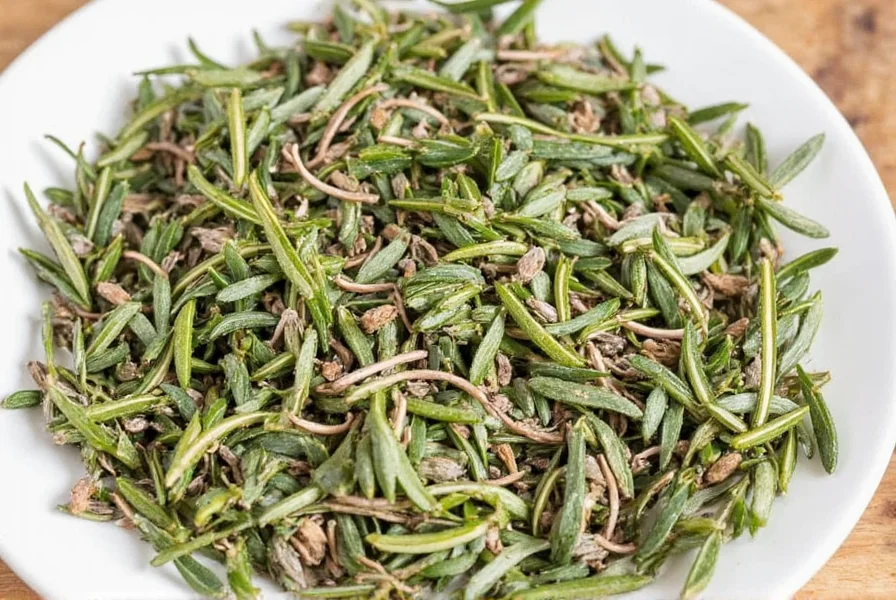
Happy cooking, drying, and experimenting—with rosemary, the possibilities are endless!

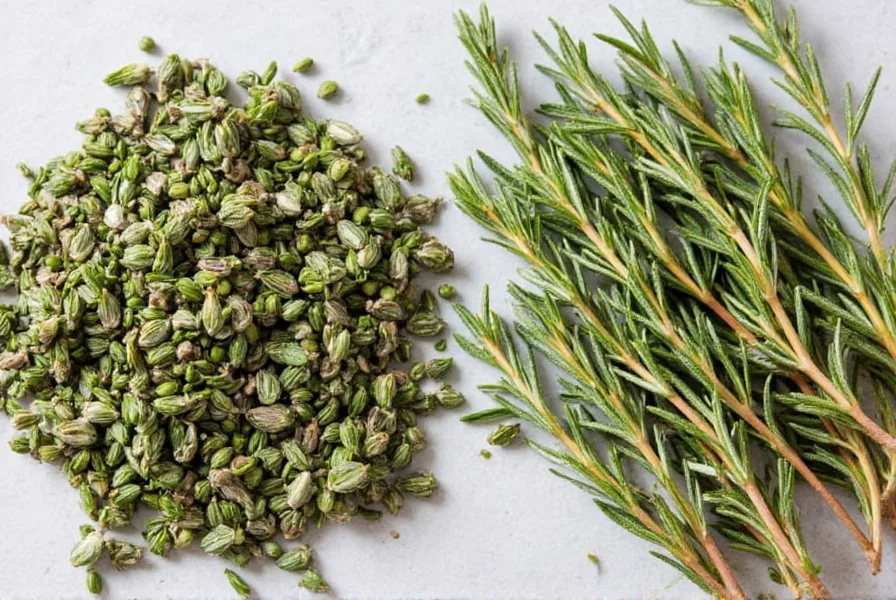









 浙公网安备
33010002000092号
浙公网安备
33010002000092号 浙B2-20120091-4
浙B2-20120091-4